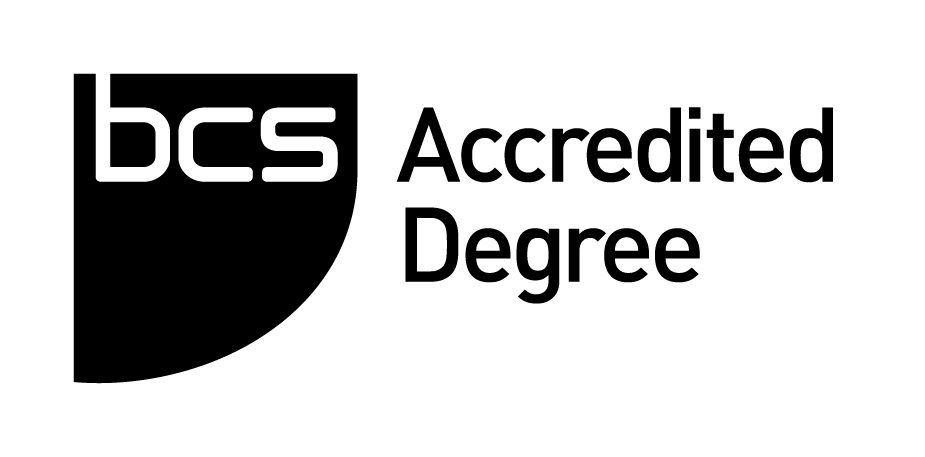.jpg)
Course details
UCAS Code
H098
Year of entry
2026
Duration
4 YRS (FT)
UCAS Tariff
48-72
Institution Code
G53
Location
Blended Learning, Wrexham
Why choose this course?
Our BSc (Hons) Cyber Security course provides you with a comprehensive foundation in cybersecurity, equipping you with the technical expertise, practical experience, and professional skills needed for a successful career in this dynamic field.
You will:
- Gain expertise and hands-on experience to defend digital systems against evolving threats
- Study in state-of-the-art facilities such as our Cyber Innovation Academy, where you’ll gain the knowledge to tackle real-world cybersecurity challenges and develop skills in threat detection, risk analysis, secure system development, and incident response
- Learn cutting-edge cybersecurity practices aligned with industry demands and emerging trends
- Be part of a research-active department working on future and emerging technologies, allowing you to learn methods that are shaping the cybersecurity world right now
- Have the opportunity to progress into diverse roles, including Penetration Tester, Cyber Security Analyst, Network Security Engineer, SOC Analyst, or even Chief Information Security Officer upon graduation
- Accredited by BCS, The Chartered Institute for IT for the purposes of fully meeting the academic requirement for registration as a Chartered IT Professional* *This degree has been accredited by BCS, The Chartered Institute for IT. Accreditation is a mark of assurance that the degree meets the standards set by BCS. An accredited degree entitles you to professional membership of BCS, which is an important part of the criteria for achieving Chartered IT Professional (CITP) status through the Institute. Some employers recruit preferentially from accredited degrees, and an accredited degree is likely to be recognised by other countries that are signatories to international accords.

Did you know?
By studying a Cyber Security degree at Wrexham University, you'll gain access to unique benefits designed to help you succeed…

Computing atWrexham University
Thinking of a career in Computing? Hear from lecturers and students about our Computing course at Wrexham University.
Key course features
- The course will reflect the latest advancements in cyber security ensuring exposure to cutting-edge technology and industry-relevant skills
- In your final year, you’ll have the opportunity to tailor your degree with a final-year project focused on your interests, whether that’s ethical hacking, secure software design, digital forensics or another cybersecurity discipline
- Benefit from innovative assessment methods - rather than just exams, assessments on this degree include labs, coding tasks, group projects, simulations, and presentations to reflect the real work of cybersecurity professionals, preparing you for your future career
- Gain a deep understanding of networking, network security, information security governance, and computer systems architecture
- Build proficiency in key programming languages and secure software development methodologies
- Explore formal languages, computability, and complexity theory to enhance analytical and problem-solving abilities
- Understand the ethical, legal, and social implications of cybersecurity, including privacy, security, and intellectual property
- Develop professional skills such as teamwork, communication, and adherence to industry standards
- Master the art of technical writing and presentation, enabling you to communicate cybersecurity concepts to both technical and non-technical audiences
- Cultivate a mindset of continuous learning to stay ahead in the fast-evolving cybersecurity landscape
- Foundation Year provides a supportive entry point to degree-level education, ensuring that you have the necessary academic skills, subject knowledge, and confidence for success
What you will study
YEAR 1 (FOUNDATION YEAR)
This year of study ensures that students from all subject backgrounds and life experiences get a foundational course of study that both prepares for subject specific and wider, university skills at an undergraduate level. You will spend time with a subject specific teaching team and a wider support network to ensure you get the support for a wide range of skills.
MODULES
- Study Skills for Success (Core): Develop the essential academic, digital, and organisational skills you will need to thrive at university. From managing your time and structuring assignments to researching and referencing, you will build the confidence to study independently and successfully.
- Collaborative Practice (Core): Work with students from other subject areas to explore cross-disciplinary challenges. You will develop key skills in teamwork, communication, and research while tackling relevant themes across different fields.
- A Day in the Life (Core): Explore the range of career paths linked to your chosen degree. You will gain insight into professional roles in your field and start creating a portfolio to support your development as a future graduate.
- Computer Hardware and Software (Optional): Gain a solid grounding in how computers work, from processors and memory to operating systems and software. You will also explore emerging technologies and trends shaping the IT sector today.
- Maths and Computing for Problem Solving (Optional): Strengthen your maths skills while learning how to apply them through programming. Topics include algebra, trigonometry, statistics, and problem-solving techniques relevant to computing and engineering.
- Foundations of Cyber Security (Optional): Learn how to identify and respond to cyber threats like malware, phishing, and social engineering. You will explore security principles and hands-on methods to protect systems and data.
YEAR 2 (LEVEL 4)
Year two provides a strong foundation in cybersecurity, computing, and software development. You will gain hands-on experience in network defence, governance, risk management, and programming, applying computational thinking to real-world challenges. You’ll also explore ethical, legal, and social aspects of cybersecurity while developing teamwork, communication, and project management skills through agile methodologies.
MODULES
- Programming Fundamentals: This module introduces fundamental programming concepts using a contemporary programming language. Upon completion, you will understand programming's role, syntax, and logic within your subject area and apply fundamental techniques to solve contextual problems effectively.
- Computer Systems and Architecture: This module provides a comprehensive understanding of computer systems and their architecture. It covers hardware, software, and their interactions, providing you with a strong foundation in computer architecture and the practical knowledge of system components and functionalities.
- Information Security and Governance: This module equips you with the knowledge, skills, and professional mindset to address complex information security challenges, ensure governance, and protect organisational information assets. It emphasises regulatory frameworks and their implementation through policies and procedures in a digital context.
- Applied Computational Methods: This module introduces the computational and mathematical concepts essential for applications in computer science, software engineering, and cybersecurity. It emphasises the relevance of these concepts in computing and the broader digital industries, aiming to enhance both cognitive and practical skills related to the field of computing.
- Network Defence: This module equips you with essential network security concepts, strategies and techniques, focusing on threat analysis, mitigation, and best practices. Through hands-on exercises and simulations, you will develop critical thinking and practical expertise in network defence. Aligned with industry standards, it prepares you for certifications, enhancing career prospects in cybersecurity.
- Network Fundamentals: This module introduces the architecture, structure, and functionality of computer networks and the Internet. Using OSI and TCP models, you will examine protocols and services across network layers. You will explore IPv4/IPv6 addressing, Ethernet fundamentals, and routing protocols in order to build a strong foundation in network communication and infrastructure.
YEAR 3 (LEVEL 5)
In year three, you will deepen your knowledge of cybersecurity theories, including distributed architecture, security by design, and secure programming. You will tackle real-world challenges, exploring ethical, legal, and sustainability issues and gain hands-on experience in system defence, detection, mitigation, and ethical hacking using industry tools. Through agile methodologies and collaborative projects, you'll refine your teamwork, communication, and organisational skills, preparing you to address industry challenges and protect digital infrastructure.
MODULES
- Group Project: This module offers essential industry-simulated experience, equipping you to manage tasks, challenges, and scenarios encountered in real-world, group-based digital projects. You will develop skills in organisation, communication, and coordination while focusing on the design, development, and implementation of a digital product aligned with professional methodologies and real-world contexts.
- Systems Engineering and Project Management: This module explores the concepts and practices essential for managing complex digital projects, emphasising the application of systems engineering principles. It provides a comprehensive understanding of systems engineering methodologies, principles, and processes, alongside advanced project management techniques required to effectively oversee the design, development, and implementation of digital solutions.
- Cloud and Distributed Architecture and Security: This module introduces the concepts, principles, and technologies underpinning cloud computing, distributed architectures, and security. You will explore the design principles and challenges of cloud and distributed systems, critically examine security risks and mitigation strategies, and investigate various cloud computing models and deployment approaches and develop practical skills in designing, implementing, and managing cloud-based and distributed systems to tackle real-world challenges.
- Cyber Operations: This module offers a comprehensive understanding of offensive and defensive cyber operations, covering key strategies, tools, and methodologies. You will explore threat mitigation, digital asset protection, and industry best practices. Hands-on learning develops practical skills for securing networks and responding to cyber threats. Preparing you for careers in cybersecurity operations and defence, this module equips you to tackle evolving cyber challenges and safeguard critical systems.
- Ethical Hacking: This module provides a comprehensive understanding of ethical hacking principles, techniques, and tools, enabling you to take a proactive approach to securing digital assets. By adopting the perspective of an ethical hacker, you will be exposed to industry-relevant methodologies, tools, and techniques used by hackers to learn, identify, assess, and address system vulnerabilities. Practical exercises will enhance your ability to analyse threats, exploit weaknesses responsibly, and implement effective security measures, preparing you for careers in cybersecurity and penetration testing.
- Secure Software Development: This module equips you with a deep understanding of software security fundamentals and its critical role in modern applications. You will identify risks and consequences of insecure development practices while familiarising yourself with industry-standard methodologies for secure software development. Key topics include secure coding practices, design principles, SDLC models, and security testing techniques such as penetration testing and vulnerability scanning. Additionally, the module covers the legal, ethical, and regulatory aspects of secure software development, preparing students to navigate the complexities of creating secure, reliable software.
YEAR 4 (LEVEL 6)
In your final year, you will apply advanced theories to real-world challenges, integrating practical experience to develop solutions for complex cybersecurity issues. You will tackle social, ethical, and sustainability concerns while refining your skills in system defence, detection, and mitigation. Through your final-year project, you'll demonstrate independence and critical thinking, applying development tools to solve industry-relevant problems. Graduate-level competencies in research, self-management, and communication will prepare you to lead in the fast-paced cybersecurity industry.
MODULES
- Project: The project module is designed to prepare you for the tasks and challenges that you may encounter in the workplace after your graduation. Its objectives are to equip you with the skills to independently plan, manage, and report on a substantial, long-term project, apply theoretical knowledge from taught modules to practical, real-world problems, and critically evaluate diverse and often conflicting information from manuals, books, and research journals. Additionally, the project offers an opportunity to specialise in an area aligned with your personal interests, enhancing your expertise and career readiness.
- Cryptography and Defensive Systems: This module provides a comprehensive understanding of cryptography and defensive systems, blending theoretical foundations with practical applications. You will explore core principles and techniques, including encryption algorithms, cryptographic protocols, and key management. Additionally, the module covers advanced defensive strategies to safeguard sensitive information and secure communication channels.
- Threat Detection and Incident Response: This module equips you with essential skills to identify, analyse, and respond to cybersecurity threats. Focusing on best practices and proven techniques, you will learn to detect and mitigate security incidents across diverse organisational contexts. The module also emphasises developing your ability to investigate and assess security incidents, create incident response plans, and implement effective remediation strategies, preparing you to confidently handle real-world security challenges.
- Digital Forensics: This module equips you with the knowledge and skills to investigate and analyse digital evidence in legal and cybersecurity contexts. Focusing on core principles and methodologies of digital forensics, it fosters critical thinking and problem-solving, enabling you to apply forensic techniques to real-world scenarios.
- Security Optimisation and Automation: This module covers the integration of security optimisation and automation using machine learning in digital environments. You will learn to apply machine learning algorithms and models for threat detection, anomaly detection, and pattern recognition, etc. to enhance security systems. Additionally, you will gain expertise in optimising security controls like access management and intrusion detection. Through practical exercises, you'll develop skills to design and implement machine learning-driven security solutions to strengthen defences against cyber threats.
The information listed in this section is an overview of the academic content of the programme that will take the form of either core or option modules. Modules are designated as core or option in accordance with professional body requirements and internal academic framework review, so may be subject to change.
Entry requirements & applying
Our general requirement for the foundation year is 48-72 UCAS tariff points, but all applications are considered individually and we consider work experience, vocational training/qualifications, as well as motivation and potential to succeed.
Applicants who do not meet the criteria above will be assessed on an individual basis by interview.
Teaching & Assessment
Teaching
The computing program suite employs a diverse range of cutting-edge industry tools and software, complemented by innovative teaching methods. This dynamic approach not only imparts industry-relevant skills but also empowers you to elevate your work to new heights when possible. The entire staff enthusiastically embraces the active learning framework (ALF), resulting in numerous enhancements to the teaching and learning experience.
Assessment
Assessments in cyber security at university level are designed to evaluate your understanding, application, and proficiency in various aspects of the discipline. These assessments encompass a diverse range of methods, including:
- Coursework and Projects: Assignments and projects provide hands-on experience, allowing you to apply theoretical knowledge to real-world scenarios. This may include software development projects, research papers, or problem-solving tasks.
- Coding Assignments: Practical coding assignments assess your programming skills, logical reasoning, and ability to develop efficient and effective code.
Group Projects: Collaborative projects evaluate teamwork, communication, and the ability to work in diverse teams, reflecting the collaborative nature of the tech industry. - Presentations: You may be required to present your findings, solutions, or project outcomes, enhancing your communication and presentation skills.
- Laboratory Work: Practical sessions in computer labs assess your ability to apply concepts, troubleshoot issues, and work with various tools and technologies.
- Problem-solving Exercises: These exercises challenge you to solve complex problems, encouraging critical thinking and analytical skills.
- Reports and Documentation: Writing reports or documenting project processes assesses your ability to communicate technical information clearly and concisely.
Career prospects
Our dedicated Careers and Employability team is committed to helping you achieve your professional goals. They provide personalised advice, useful resources, and extracurricular employability events to prepare you for the job market.
Graduates of this course can pursue careers in:
- Cyber Security Architect
- Cyber Security Analyst
- Cyber Assurance Manager
- Network Security Engineer
- Network Administrator
- Penetration Tester
- Information Security consultant
- Security Operations Centre Analyst
- Network Engineer
- IT Systems Engineer
- Application Security Engineer
- Chief Information Security Officer
- Security Consultant
Additionally, you may choose to further your expertise through postgraduate studies. Explore our postgraduate courses for more information.
Fees & funding
You do not have to pay your tuition fees upfront.
The fees you pay and the support available will depend on a number of different factors. Full information can be found on our fees & finance pages. You will also find information about what your fees include in the fee FAQs.
All fees are subject to any changes in government policy, view our undergraduate fees.
Accommodation
At Wrexham University, we offer on-campus en-suite rooms within our Wrexham Student Village. These private, fully furnished spaces are conveniently located, providing easy access to campus facilities, study areas, and social spaces. Plus, you’re just a 10-minute walk from the city centre!
With all bills included, free Wi-Fi, 24/7 security, and large social areas, you’ll find everything you need for a great student experience.
Explore our student accommodation options to find your perfect home away from home.
Upcoming Open Days.
Join us at an upcoming open day to meet your lecturers, find out more about our courses, discover our facilities and get a taste of student life.
Browse all of our open days & events.



